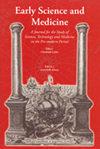调和神秘特质:早期现代医学思想中的磁性和复杂性
IF 0.5
2区 哲学
Q3 HISTORY & PHILOSOPHY OF SCIENCE
引用次数: 0
摘要
在中世纪的自然哲学和医学中,磁性吸引是所谓的“神秘品质”或“神秘力量”最常被引用的例子。根据盖伦、阿佛洛狄西亚的亚历山大和阿维森纳的观点,磁性是由一种不可感知的性质引起的,而不是由四种基本性质(热、冷、湿、干)之一引起的。然而,在中世纪已经有争议的是,磁铁的“气质”、“混合物”或“肤色”是否不能解释铁的吸引力。在现代早期,训练有素的医生首先越来越多地驳斥磁学中的“神秘性质”,同时保留盖伦的框架。相反,他们提出了更复杂的理论,援引磁铁和铁的“肤色”或它们单一的主要品质,如“湿度”或“热量”。医学概念经常与气象概念相结合,形成自然现象(如磁力)的因果理论。通过讲述磁性理论中这个闻所未闻的“肤色”故事,我们不仅展示了医学理论是如何从医学转移到其他研究领域的,而且还展示了现代史学中既定的叙述是非常值得怀疑的:与当时的批评家(如笛卡儿)和许多现代历史学家的假设相反,在16世纪和17世纪,一些盖伦学派的医生并不认同神秘性质的理论(以磁力为例)。本文章由计算机程序翻译,如有差异,请以英文原文为准。
Tempering Occult Qualities: Magnetism and Complexio in Early Modern Medical Thought
In medieval natural philosophy and medicine, magnetic attraction was the most commonly invoked example for the effects of so-called ‘occult qualities’ or ‘occult powers.’ According to this conception – which dates back to Galen, Alexander of Aphrodisias, and Avicenna – magnetism was caused by an insensible quality and not, therefore, by one of the four primary qualities (hot, cold, wet, dry). Already disputed in medieval times, however, was whether the magnet’s ‘temperament’, ‘mixture’ or ‘complexion’ might not account for the attraction of iron. In the early modern period, trained physicians above all increasingly refuted ‘occult qualities’ in magnetism, while at the same time retaining a Galenic framework. They argued instead for more elaborate theories invoking the magnet’s and iron’s ‘complexion’ or their single primary qualities, such as ‘humidity’ or ‘heat.’ Medical concepts were often combined with meteorological ideas for causal theories of natural phenomena like magnetism. By telling this unheard story of ‘complexion’ in theories of magnetism, we show not only how medical theories were transferred from medicine into other fields of research, but also that an established narrative in modern historiography is highly questionable: contrary to what was assumed by the contemporary critics (e.g., Descartes) and many modern historians, several Galenic physicians did not subscribe to a theory of occult qualities (in the case of magnetism) in the sixteenth and seventeenth centuries.
求助全文
通过发布文献求助,成功后即可免费获取论文全文。
去求助
来源期刊

Early Science and Medicine
HISTORY & PHILOSOPHY OF SCIENCE-
CiteScore
0.50
自引率
0.00%
发文量
22
审稿时长
>12 weeks
期刊介绍:
Early Science and Medicine (ESM) is a peer-reviewed international journal dedicated to the history of science, medicine and technology from the earliest times through to the end of the eighteenth century. The need to treat in a single journal all aspects of scientific activity and thought to the eighteenth century is due to two factors: to the continued importance of ancient sources throughout the Middle Ages and the early modern period, and to the comparably low degree of specialization and the high degree of disciplinary interdependence characterizing the period before the professionalization of science.
 求助内容:
求助内容: 应助结果提醒方式:
应助结果提醒方式:


